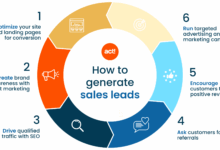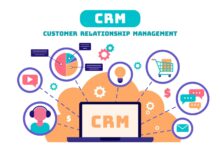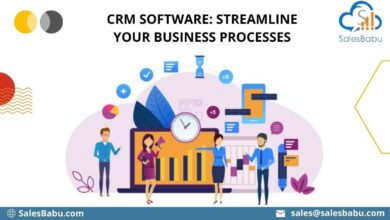AI-Powered CRM Software: Revolutionizing Customer Relationship Management
Starting with AI-Powered CRM Software, this cutting-edge technology is reshaping how businesses manage their customer relationships, paving the way for more efficient and personalized interactions.
As artificial intelligence continues to drive advancements in CRM systems, companies are leveraging AI features like sentiment analysis, lead scoring, and chatbots to enhance customer experiences.
Overview of AI-Powered CRM Software
Artificial intelligence (AI) plays a crucial role in modern Customer Relationship Management (CRM) systems by enhancing various processes to improve customer interactions and satisfaction. AI-powered CRM software utilizes advanced algorithms to automate tasks, analyze data, and personalize customer experiences more effectively than traditional CRM systems.
Comparison between AI-Powered CRM and Traditional CRM
AI-powered CRM software outperforms traditional systems in automation, predictive analytics, and personalization. For instance, AI can automate routine tasks like data entry and email responses, predict customer behavior based on historical data, and personalize marketing campaigns in real-time. Popular AI features in CRM software include sentiment analysis to gauge customer emotions, lead scoring to prioritize sales leads, and chatbots for instant customer support.
Implementation of AI in CRM Systems
Integrating AI into CRM software involves steps like data collection, model training, and deployment. Machine learning algorithms are used to analyze vast amounts of customer data, identify patterns, and generate insights for improved decision-making. Training AI models for specific CRM tasks, such as sales forecasting or customer segmentation, requires labeled data and iterative refinement to achieve accurate results.
Measuring the Effectiveness of AI in CRM
Key performance indicators (KPIs) like customer retention rates and response times are used to evaluate the impact of AI on CRM performance. A/B testing can be conducted to compare the effectiveness of AI-driven strategies against traditional methods, allowing businesses to refine their CRM approaches. Optimizing AI algorithms in CRM systems involves continuous monitoring, feedback integration, and algorithmic adjustments for better results over time.
Ethical Considerations in AI-Powered CRM
Ethical issues in AI-powered CRM systems include concerns about data privacy, algorithm bias, and transparency in decision-making processes. To ensure ethical use of AI, companies must implement data protection measures, conduct algorithm fairness assessments, and prioritize customer trust and privacy. Successful navigation of ethical challenges in AI implementation can enhance customer relationships and loyalty.
Future Trends in AI-Enhanced CRM
Upcoming trends in AI technology, such as voice recognition, hyper-personalization, and augmented analytics, are set to revolutionize CRM systems further. Advancements in natural language processing and image recognition will enable deeper customer insights and personalized experiences. To stay ahead, businesses should adopt emerging AI trends in their CRM strategies for competitive advantage and enhanced customer engagement.
Implementation of AI in CRM
AI integration into CRM software involves a series of steps to train AI models and deploy them effectively within CRM systems. This process enables businesses to leverage AI technologies to enhance customer interactions and drive better outcomes.
AI Technologies in CRM
AI technologies commonly used in CRM systems include:
- Natural Language Processing (NLP) for sentiment analysis
- Machine Learning for customer segmentation
- Chatbots for customer support
Challenges and Benefits of Implementing AI in CRM
Implementing AI in CRM solutions presents both challenges and benefits:
- Challenges:
- Data privacy concerns related to handling sensitive customer information
- The need for specialized AI skills in the workforce to effectively manage AI-powered CRM systems
- Benefits:
- Potential for personalized customer experiences through AI-driven insights
- Improved efficiency and accuracy in customer interactions
- Enhanced customer satisfaction and loyalty through proactive engagement
Personalization and Customer Insights
AI-powered CRM software plays a crucial role in enabling personalized customer experiences by leveraging advanced algorithms to analyze vast amounts of customer data. This allows businesses to tailor their interactions with customers based on their unique preferences and behaviors.
Analyzing Customer Data with AI
AI helps businesses extract valuable insights from customer data by using machine learning algorithms to identify patterns and trends. This analysis enables companies to better understand their customers’ needs and preferences, ultimately leading to more targeted marketing strategies and personalized communication.
- AI can analyze customer interactions across multiple touchpoints, such as social media, email, and website visits, to provide a comprehensive view of customer behavior.
- By identifying key indicators of customer satisfaction and engagement, AI helps businesses make data-driven decisions to enhance the overall customer experience.
Personalizing Product Recommendations
AI algorithms play a vital role in personalizing product recommendations by analyzing customer interactions and purchase history. By understanding each customer’s preferences and behavior, businesses can recommend products that are tailored to their individual needs, increasing the likelihood of a purchase.
AI algorithms use collaborative filtering and predictive analytics to suggest products based on similar customers’ preferences and past buying behavior.
Segmenting Customers and Tailoring Marketing Campaigns
Utilizing AI to segment customers based on demographics, behavior, and preferences allows businesses to create targeted marketing campaigns that resonate with specific customer segments. By delivering personalized content and offers, companies can enhance customer engagement and drive conversions.
- AI-powered CRM software can analyze customer data in real-time to identify high-value segments and allocate marketing resources effectively.
- By tailoring marketing messages to different customer segments, businesses can improve campaign performance and ROI.
Real-time Data Processing and Sentiment Analysis
Real-time data processing capabilities of AI technologies enable businesses to respond promptly to customer inquiries and feedback, leading to improved customer satisfaction. AI-powered sentiment analysis tools help companies gauge customer sentiment towards their brand, products, and services, allowing them to address potential issues proactively.
- AI sentiment analysis tools can monitor social media, customer reviews, and survey responses to provide insights into customer perceptions and sentiment.
- By analyzing sentiment trends, businesses can adjust their strategies to align with customer expectations and preferences.
Automation and Efficiency
Automation plays a crucial role in enhancing efficiency within CRM processes by leveraging AI technology to streamline operations and eliminate manual tasks. This results in significant time savings and improved productivity across sales, marketing, and customer support departments.
Automating Repetitive Tasks
- AI-powered CRM software automates repetitive tasks such as data entry, lead scoring, and email responses, allowing sales teams to focus on high-value activities.
- By automating routine processes, AI helps in reducing human errors and ensures consistency in data management within the CRM system.
- Automated workflows enable faster response times to customer inquiries, leading to enhanced customer satisfaction and loyalty.
Streamlining Sales, Marketing, and Customer Support Operations
- AI-driven automation streamlines sales operations by providing predictive analytics to identify potential leads, prioritize opportunities, and optimize sales strategies.
- In marketing, AI automates campaign management, personalized content creation, and lead nurturing, resulting in targeted and effective marketing campaigns.
- For customer support, AI chatbots assist in resolving common queries, routing tickets to the appropriate agents, and providing 24/7 support, enhancing the overall customer experience.
Improving Efficiency in CRM Workflows
- AI analyzes customer data to provide personalized recommendations, automate follow-up actions, and predict customer behavior, leading to increased sales conversions and customer engagement.
- Automated reporting and analytics enable real-time insights into customer interactions and sales performance, empowering teams to make data-driven decisions quickly.
- By automating repetitive tasks and optimizing workflows, AI-powered CRM software enhances operational efficiency, reduces costs, and drives business growth.
Predictive Analytics and Forecasting
Predictive analytics and forecasting are essential components of AI-powered CRM software, enabling businesses to anticipate future trends and make informed decisions based on data-driven insights.
Sales Forecasting
AI in CRM software leverages historical data, customer interactions, and behavior patterns to predict sales outcomes accurately. By analyzing past sales performance and customer data, AI algorithms can forecast future sales trends, identify potential opportunities, and optimize sales strategies for better results.
- AI-powered forecasting tools provide businesses with accurate sales predictions, helping them allocate resources effectively and set realistic targets.
- By forecasting sales trends, organizations can anticipate demand fluctuations, optimize inventory management, and align marketing strategies to meet customer needs proactively.
- AI algorithms can also identify patterns in customer behavior, such as buying preferences, purchase frequency, and engagement levels, enabling businesses to personalize their interactions and improve customer satisfaction.
Customer Behavior Prediction
AI in CRM systems can predict customer behavior by analyzing historical data, social media interactions, website visits, and purchase patterns. By leveraging machine learning algorithms, businesses can anticipate customer needs, preferences, and potential churn risks.
For example, AI can predict which customers are likely to churn based on their past interactions and engagement levels, allowing businesses to take proactive measures to retain those customers through targeted marketing campaigns or personalized offers.
- AI-powered customer behavior prediction helps businesses enhance customer loyalty, increase retention rates, and improve overall customer satisfaction by delivering personalized experiences tailored to individual preferences.
- By analyzing customer data in real-time, AI can identify upselling and cross-selling opportunities, recommend relevant products or services, and anticipate customer needs before they even express them.
Integration Capabilities
When it comes to AI-powered CRM software, seamless integration with other business applications is crucial for maximizing efficiency and effectiveness. The ability to connect with various platforms and tools ensures a smooth flow of data and communication across the organization.
Role of APIs in Integration
Application Programming Interfaces (APIs) play a vital role in connecting AI-driven CRM systems with third-party platforms. APIs act as bridges that enable different software applications to communicate and share data in real-time. By leveraging APIs, AI CRM software can integrate seamlessly with a wide range of tools and systems.
Examples of Successful Integrations
- Integrating AI CRM software with email marketing platforms like Mailchimp for targeted and personalized email campaigns.
- Connecting AI CRM systems with social media management tools such as Hootsuite for monitoring customer interactions and engagement on social platforms.
- Integrating AI-powered CRM with e-commerce platforms like Shopify to track customer behavior and preferences for tailored shopping experiences.
- Connecting AI CRM software with customer service platforms like Zendesk for streamlined support ticket management and resolution.
Customer Service Enhancements
AI plays a crucial role in enhancing customer service interactions within CRM systems by providing personalized and efficient support to customers. Through the use of advanced technologies, such as chatbots and virtual assistants, businesses can improve their customer support processes and overall satisfaction levels.
Chatbots and Virtual Assistants
Chatbots and virtual assistants powered by AI are revolutionizing customer service by providing instant responses to queries, resolving issues promptly, and offering personalized recommendations. These intelligent tools can handle a high volume of customer interactions simultaneously, ensuring round-the-clock support without human intervention.
- Chatbots can assist customers in finding products, placing orders, tracking shipments, and resolving common issues without the need for human agents.
- Virtual assistants can engage in natural language conversations with customers, providing a more personalized and human-like interaction experience.
- These AI-powered tools can also collect valuable data on customer preferences and behaviors, enabling businesses to deliver tailored solutions and anticipate future needs.
Examples of AI Technologies in CRM Software
Several AI technologies are integrated into CRM software to elevate the quality of customer service and streamline support processes.
For instance, sentiment analysis tools can analyze customer feedback and social media posts to gauge customer satisfaction levels and identify potential issues before they escalate.
- Machine learning algorithms can predict customer preferences and recommend relevant products or services based on past interactions and behaviors.
- Natural language processing (NLP) capabilities enable CRM systems to understand and respond to customer inquiries in real-time, improving response times and accuracy.
- Voice recognition technology allows customers to interact with virtual assistants through voice commands, enhancing convenience and accessibility.
Data Security and Privacy
Data security and privacy are crucial aspects of AI-powered CRM systems to ensure the protection of sensitive customer information and maintain trust. Implementing robust measures is essential to safeguard data and prevent unauthorized access.
Measures for Data Security
- Utilization of encryption techniques to secure data transmission and storage.
- Implementation of access control mechanisms to restrict unauthorized users from accessing confidential information.
- Regular security audits to identify vulnerabilities and address them promptly.
Challenges of Maintaining Data Integrity
One of the challenges of using AI in CRM is ensuring data integrity. As AI algorithms analyze vast amounts of data, there is a risk of errors or biases affecting the accuracy of insights generated. It is crucial to continuously monitor and validate the data to maintain integrity.
Best Practices for Securing Customer Data
- Establishing strict data access permissions based on roles and responsibilities.
- Regularly updating security protocols and implementing multi-factor authentication for user verification.
- Training employees on data security best practices to prevent human errors that could compromise data.
Role of Encryption and User Authentication
Encryption plays a vital role in protecting sensitive customer information within AI-powered CRM systems by encoding data to prevent unauthorized access. User authentication protocols further enhance security by verifying user identities before granting access to CRM data.
Security Features of Cloud-based vs. On-premise CRM Systems
Cloud-based CRM solutions offer benefits like scalability and accessibility, but may raise concerns about data residency and compliance. On-premise AI CRM systems provide greater control over data storage and security but require significant infrastructure investments. Both options have their security features, and organizations must evaluate their specific needs to choose the most secure solution.
Scalability and Customization
AI-powered CRM software offers scalability and customization options that are crucial for businesses of all sizes to adapt and grow efficiently. These features enable companies to tailor their CRM systems according to their unique requirements, ensuring a seamless customer relationship management process.
Scalability with Business Growth
AI-powered CRM software is designed to scale with the growth of a business, accommodating an increasing volume of customer data, interactions, and transactions. As a company expands, the AI algorithms in the CRM system can handle larger datasets and more complex analysis, providing valuable insights to support decision-making.
Flexibility and Adaptability
The flexibility of AI CRM systems allows businesses to customize their CRM solutions to meet specific needs and industry requirements. Whether it’s configuring workflows, creating personalized customer journeys, or integrating third-party applications, AI-powered CRM software can be tailored to suit diverse business environments.
Customization Options
- Custom fields and modules for industry-specific data tracking
- Personalized dashboards and reporting functionalities
- Integration with specialized tools for e-commerce, healthcare, or finance
Comparison with Traditional CRM Systems
Compared to traditional CRM systems, AI-powered CRM software offers greater scalability and adaptability. The advanced machine learning capabilities of AI algorithms enable real-time data processing, predictive analytics, and automated responses, enhancing overall operational efficiency.
Integrating New Features
Integrating new features into an AI CRM system involves assessing business requirements, selecting the appropriate tools or modules, and configuring the system to optimize performance. Regular updates and enhancements ensure that the CRM solution remains aligned with evolving business needs.
Tailoring to Specific Verticals
AI CRM platforms can be customized to suit specific business verticals such as e-commerce, healthcare, or finance by leveraging industry-specific data models, algorithms, and integrations. This enables businesses to address unique challenges and deliver personalized customer experiences.
Leveraging Customization Tools
Businesses can enhance customer experiences by leveraging AI CRM customization tools through:
- Segmenting customer data for targeted marketing campaigns
- Automating personalized interactions based on customer preferences
- Implementing dynamic pricing strategies for increased sales
Role of AI Algorithms in Personalization
AI algorithms play a crucial role in personalizing CRM solutions by analyzing customer behavior, predicting future trends, and recommending tailored actions. By understanding customer needs and preferences, businesses can deliver relevant and engaging interactions, fostering long-term relationships.
Training and User Adoption
Training and user adoption are crucial components when implementing AI-driven CRM systems in organizations. Effective training ensures that users can fully utilize the AI features of CRM software, leading to improved efficiency and better customer insights. Promoting user adoption involves strategies to encourage employees to embrace AI technology in their daily workflows.
Training Requirements for Users
- Training sessions should cover the basics of AI technology and how it integrates into the CRM software.
- Advanced training on specific AI features like predictive analytics and automation should be provided for users handling data analysis and customer interactions.
- Regular refresher courses and updates on AI advancements should be included to keep users up-to-date with the latest capabilities of the CRM software.
Promoting User Adoption
- Engage employees in the implementation process and highlight the benefits of using AI-driven CRM systems for their daily tasks.
- Create a culture of learning and exploration by encouraging users to experiment with AI features and provide feedback on their experiences.
- Reward employees who actively participate in AI training programs and showcase successful implementations of AI in CRM through internal communication channels.
Role of Personalized Training Modules
- Customize training modules based on users’ roles, responsibilities, and proficiency levels with technology to ensure relevance and effectiveness.
- Provide hands-on exercises and real-world simulations to help users experience the practical applications of AI features in CRM software.
- Offer personalized feedback and support to address individual learning needs and challenges during the training process.
Incorporating Gamification Elements
- Integrate gamification elements like leaderboards, badges, and rewards into AI training sessions to make learning more engaging and interactive.
- Create friendly competitions and challenges that motivate users to explore AI features, complete training modules, and enhance their skills in using CRM software.
Measuring Effectiveness of AI Training Initiatives
- Track user engagement and completion rates of training programs to assess the uptake of AI features among employees.
- Gather feedback from users on the usefulness and practicality of AI training sessions to identify areas for improvement and optimization.
- Analyze key performance indicators (KPIs) related to AI adoption, such as increased productivity, enhanced customer satisfaction, and improved decision-making based on AI insights.
Competitive Advantage
AI-powered CRM software offers businesses a significant competitive edge in the market by enabling them to harness the power of artificial intelligence to enhance customer relationships, streamline processes, and make data-driven decisions. This technology allows companies to stay ahead of the competition by delivering personalized experiences, improving operational efficiency, and predicting customer behavior with greater accuracy.
Leveraging AI Technologies
- AI-powered CRM systems can analyze vast amounts of customer data in real-time, enabling businesses to gain valuable insights into customer preferences, behavior patterns, and trends.
- By leveraging AI algorithms, companies can automate repetitive tasks, such as data entry, lead scoring, and email communications, freeing up valuable time for employees to focus on high-value activities.
- AI-enhanced CRM solutions can provide predictive analytics that help businesses forecast customer needs, anticipate market trends, and identify opportunities for growth.
Examples of Competitive Advantage
- Amazon utilizes AI in its CRM system to offer personalized product recommendations to customers based on their browsing history and purchase behavior, leading to increased sales and customer satisfaction.
- Salesforce’s Einstein AI platform enables businesses to deliver tailored marketing campaigns, predict customer churn, and optimize sales processes, resulting in improved customer retention and revenue generation.
- Zoho CRM leverages AI to provide real-time insights into sales performance, automate lead management, and enhance customer support, giving businesses a competitive edge in efficiency and customer service.
Future Trends and Innovations
AI-powered CRM software is constantly evolving, paving the way for exciting future trends and innovations in customer relationship management. As technology advances, it is essential to explore how AI is shaping the future of CRM and the potential innovations it may bring.
Enhanced Customer Engagement
AI is expected to revolutionize customer engagement in CRM software by providing personalized and interactive experiences. Chatbots powered by AI can offer real-time assistance to customers, addressing their queries and concerns promptly. This level of personalized interaction can significantly enhance customer satisfaction and loyalty.
- AI-driven sentiment analysis to understand customer emotions and preferences.
- Integration of virtual assistants for seamless customer interactions.
- Predictive analytics for proactive engagement based on customer behavior patterns.
Advanced Analytics and Insights
The future of AI-powered CRM software lies in its ability to provide advanced analytics and insights for better decision-making. AI algorithms can analyze vast amounts of data to uncover valuable trends and patterns, enabling businesses to make informed strategies and predictions.
- Machine learning models for predictive analytics and forecasting.
- Automated data visualization tools for actionable insights.
- AI-powered recommendation engines for personalized product suggestions.
Augmented Reality Integration
One of the emerging trends in AI-powered CRM software is the integration of augmented reality (AR) for enhanced customer experiences. AR technology can allow customers to visualize products in real-time, providing a more immersive shopping experience and increasing engagement.
- AR-powered virtual try-on features for fashion and beauty industries.
- Interactive product demonstrations through AR applications.
- Enhanced customer support with AR-guided troubleshooting and assistance.
Case Studies and Success Stories
Implementing AI-powered CRM software has led to remarkable success stories in various industries, showcasing the transformative impact of AI on customer relationships and business performance.
Real-world Examples of AI CRM Implementation
- Company A, a global e-commerce retailer, saw a 20% increase in sales conversion rates after integrating AI algorithms for personalized product recommendations based on customer behavior analysis.
- Company B, a telecommunications provider, improved customer satisfaction by 30% through AI-driven chatbots that handled customer queries efficiently and accurately, reducing response times significantly.
- Company C, a financial services firm, achieved a 25% reduction in customer churn by utilizing AI predictive analytics to identify at-risk customers and proactively engage with personalized retention strategies.
Strategies for Seamless Integration of AI CRM Solutions
- Investing in comprehensive training programs for employees to ensure a smooth transition and maximize the utilization of AI CRM capabilities.
- Collaborating with AI CRM vendors to customize solutions according to specific business needs and align them with existing workflows for optimal performance.
- Conducting regular performance evaluations and feedback sessions to identify areas of improvement and refine AI algorithms for better results.
Measurable Benefits of AI CRM Adoption
- Studies have shown that businesses leveraging AI-powered CRM systems experience a 30% increase in customer retention rates and a 25% boost in overall sales revenue.
- AI-driven personalization techniques have led to a 40% rise in cross-selling opportunities and a 35% improvement in customer satisfaction levels among early adopters.
Recommendations for Businesses Embarking on AI CRM Journey
- Thoroughly evaluate AI CRM vendors based on their track record, industry expertise, and scalability to ensure a successful implementation that aligns with long-term business goals.
- Establish clear implementation timelines and milestones to track progress effectively and address any challenges or bottlenecks that may arise during the process.
Conclusion
In conclusion, AI-Powered CRM Software offers a glimpse into the future of customer relationship management, promising increased efficiency, personalization, and ethical considerations that will shape the industry for years to come.






